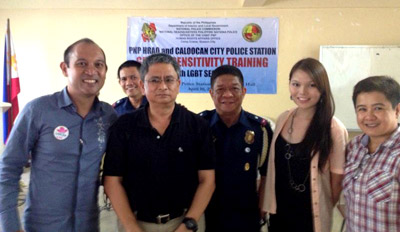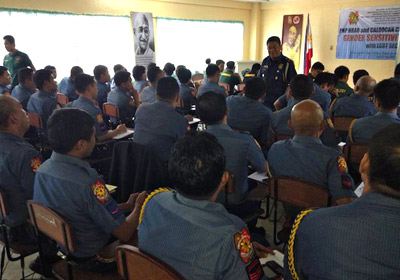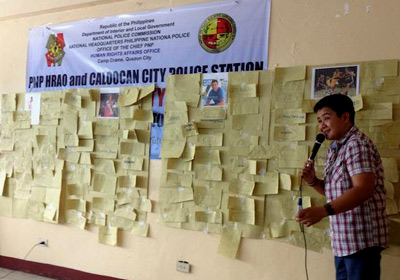The 1-day training session held on April 10 included exercises on gender imaging, lectures on LGBT basic concepts, personal sharing from LGBT advocates, and sharing of responses among the participants.
Co-organiser and trainer Raymond Alikpala told Fridae organisers hope to conduct the LGBT sensitisation training in other cities and regions across the country, and alongside the standard Philippine National Police (PNP) Human Rights Affairs Office (HRAO) training on vulnerable sectors (women, children, elderly, persons with disabilities). He added that officers in Pasay City will be trained this Friday, and Muntinlupa and Quezon City have been lined up in the next two months.

From left: Raymond Alikpala, Noel A. Ruiz, Gen. Nestor M. Fajura,
Pat Bringas and Ging Cristobal. Photos courtesy of Raymond Alikpala.
Alikpala, who is a lawyer, author of Of God and Men: A Life in the Closet and the third congressional nominee of Ladlad partylist, told Fridae that the main challenges the police officers face is their “lack of knowledge on LGBT issues and concerns, resulting in prejudice, stereotyping and discrimination.” So the training has been “designed as a general introduction to LGBT issues, with the hope that this will provide the police officers sufficient foundation to study these issues further."

Chief of the Philippine National Police Human Rights Affairs Office,
General Nestor Fajura, addressing the officers.

Filipino activist Ging Cristobal, Project Coordinator for Asia and the
Pacific Islands, International Gay and Lesbian Human Rights Commission
was the main trainer.
Speakers at the seminar included Filipino activist Ging Cristobal, Project Coordinator for Asia and the Pacific Islands at the US-based International Gay and Lesbian Human Rights Commission (IGLHRC); University of the Philippines Diliman Student Council Vice-Chair Pat Bringas who is a transgender woman; and the chief of the PNP Human Rights Affairs Office, General Nestor Fajura.
Alikpala, 47, who is formerly a seminarian and who only came out as gay at 38, said in a Facebook post related to the training session that even at the very young age of four, he was afraid of the word “bakla” (a derogatory term to mean an effeminate gay men) without knowing what it actually meant and how that “ineffable fear confused (him), consumed (him) which led to what (he) now recalls as an unhappy childhood.”
He then related an exchange with a police officer, who is also the father of a gay child: “One middle-aged police officer raised his hand and asked a question, ‘Sir, when did this fear disappear?’ I replied that it disappeared only after I came out of the closet at age 38, when I completely and publicly embraced my homosexuality. Before that, even as an otherwise successful lawyer at age 30-something, the fear still held me by the neck, I told the police officer.
“‘What do you think that fear was?’ the officer asked again.
“It was the fear of rejection, I said, the fear of a young boy that his parents would reject him if they found out the truth about their son. For a young boy, I told the officer, the fear of rejection by his parents is equivalent to death.”
He added that the police officer later shared with his fellow officers that he has been struggling to accept the fifth of his six children who is gay. He said that the training and Alikpala’s sharing of his own growing up experiences had given him a better understanding of what his son was going through.
Alikpala wrote: “He said he as a father could feel his son’s fears. He has been repeatedly asking God why his son was gay, but he now realised that to expect an answer from God would be to put himself on the same level as God. The correct response of a good father, he said, was to accept his gay son as a blessing, and to love him just the same. The audience applauded.”











 Printable Version
Printable Version


















Reader's Comments
Be the first to leave a comment on this page!
Please log in to use this feature.